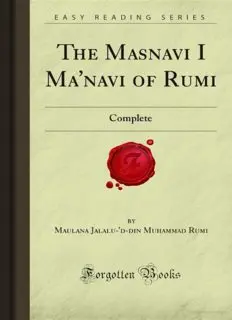
The Masnavi I Ma'navi of Rumi: Complete (Forgotten Books) PDF
Preview The Masnavi I Ma'navi of Rumi: Complete (Forgotten Books)
EASY READ I NG SERIES I T H E ASNAVI A'NAVI OF R U M I Complete BY MAULANA JALALU-'O-O IN M UHAMMAD R UMI ctt t I " Forgotten Books takes the uppermost care to preserve the wording and images from the original book. However, this book has been scanned and reformatted from the original, and as such we connot guarantee thar it is free from errors or contains the full content of the original. The Masnavi I Ma'navi of Rumi Complete By Maulana 'alalu·'d-din Muhammad Rumi 'Translated from Urdu by E.H. Whinfield first published 1898 Republished 2008 by Forgotten Books www.jorgottenbooks.org o ' DID YOU KNOW. •• ? You con read any and all of our thousands of books online for FREE Just visit: www·forgottenbooks.org III "' o viJ PUBLISHER'S PREFACE About the Book The primary 19th century translation of Rumi's masterwork. About the Author Maulana Jalalu-'d-din Muhammad Rumi (1207 -1273) "Mawlana Jalal-ad-Din Muhammad Rumi, also known as Mawlana Jalal-ad Din Muhammad Balhi, but known to the English-speaking world simply as Rumi, (September 30, 1207-December 17, 1273), was a 13th century Persian (Tadjik) poet, Islamic jurist, and theologian. Rumi is a descriptive name meaning "the Roman" since he lived most parts of his life in Anatolia which had been part of the Roman Empire until the Seljuq conquest two centuries earlier. Modern scholars now believe that Rumi was probably born in 1207 CE in Wakhsh/Vakhsh (In modern day Tajikistan, then under rule of Ghuridsl. while traditional sources claim his father family had for several generations lived in Balkh (In modern day Afghanistan, then incorporated into the Khwarezm Empire around 1205 eEl. Both these cities were at the time included in the Greater Persian cultural sphere of Khorasan, the easternmost province of historical Persia. His birthplace and first language both indicate a Persian heritage. Due to quarrels between different dynasties in Khorasan, opposition to Khwarizmid Shahs who were considered devious by Rumi's father or fear of the impending Mongol cataclysm, Baha-e Walad (Rumi's father) decided to migrate westwards. Rumi traveled west with his father and family, first performing the Hajj and eventually settling in Konya (In modern day Turkey, then in the Seljuk Sultanate of Rum), where he lived most of his life, composed one of the crowning glories of Persian literature and profoundly affected the culture of the area. New Persian (also called Dari-Persian or Dari), a widely understood vernacular of Middle Persian, has its linguistic origin in the Fars Province of modern Iran. A Dari-Persian literary renaissance (In the 8th/9th century) started in regions of Sistan, Khorasan and Transoxiana and by the 10th/11th century, it overtook Arabic as the literary and cultural language in the Persian Islamic world. He lived most of his life under the Seljuk T viii Sultanate of Rum, where he produced his works and died in 1273 CE in Konya. He was buried in Konya and his shrine became a place of pilgrimate. The shrine is now known as the Mevlana Museum. Following his death, his followers and his son Sultan Walad founded the Mevlevi Order, also known as the Whirling Dervishes, who are known for their famous ceremony called the sema. Rumi's importance is considered to transcend national and ethnic borders. Rumi's original works are widely read in the original Persian Language by Iranians, Afghans and Tajiks. Translations of his works are very popular in South Asian, Turkic, Arab and Western countries. His poetry has influenced Persian literature as well as Urdu, Bengali and Turkish litera tures. His poems have been widely translated into many of the world's languages in various formats, and sse News has described him as the "most popular poet in America"." (Quote from wikipedia.org) CONTENTS __________________ '" 'PIUJBrulI~SilH~ERR~'S~PRRBEF~A~C£E BOOK I 1 BOOK II 54 flOOK III 98 BOOK IV 151 BOOK V 194 flOOK VI 240
